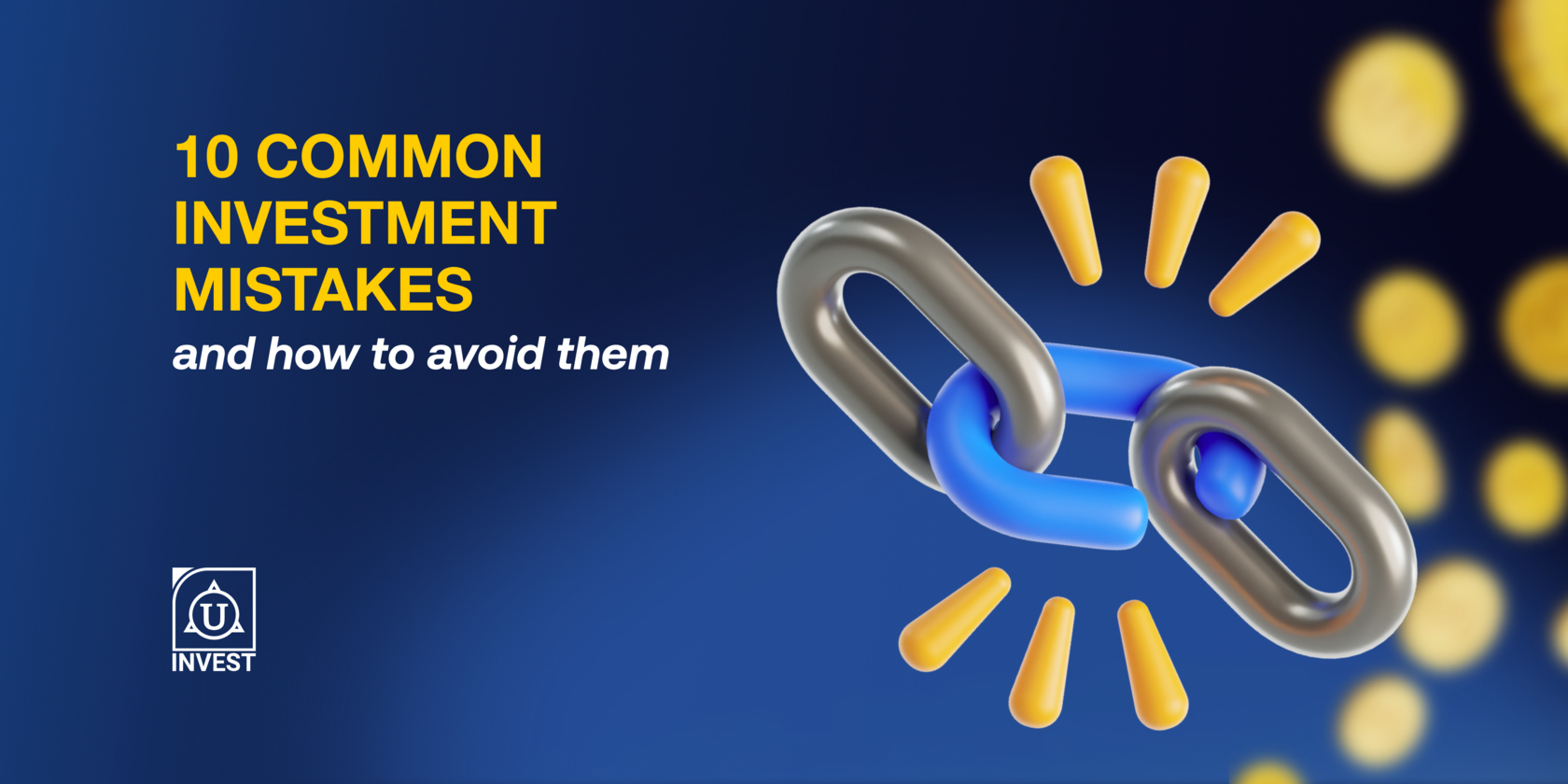Investments are a powerful way to increase your income, but only if they are managed properly. For financial growth and stability, it is vital to avoid making mistakes when making investment decisions and to remember that each decision can have significant consequences in the future.
Let’s discuss the 10 most common investment mistakes and tips on how to avoid repeating them.
Let’s discuss the 10 most common investment mistakes and tips on how to avoid repeating them.
1. Lack of clear investment goals
Start your investment journey with a well-defined plan. Setting clear, achievable goals allows you to track your progress and builds a strong foundation for future growth. Consider factors such as the duration of your investments - whether short or long term - your expected returns over a given period of time, and the actions you can take in response to potential market fluctuations. The answers to these and similar questions will shape the strategy you follow when making investment decisions.
2. Developing emotional attachment to investments
Many investors develop an emotional attachment to companies in which they’ve invested, especially when their stock investments bring success and high profits. While investing may seem like a purely numerical activity, emotions can still play a role.
To avoid unnecessary emotional decisions, always remind yourself why you originally invested in that particular company. Keep in mind that investments are made for business purposes, not personal attachment, and should be based on clear, rational analysis. Be prepared to sell your shares when necessary, even if you have a personal preference for the company.
To avoid unnecessary emotional decisions, always remind yourself why you originally invested in that particular company. Keep in mind that investments are made for business purposes, not personal attachment, and should be based on clear, rational analysis. Be prepared to sell your shares when necessary, even if you have a personal preference for the company.
3. Failing to conduct proper market research
Many investors fail to do the necessary research before making investment decisions, and they often get it wrong. They follow unprofessional advice or rumours, or base their decisions on short-term market trends rather than their own goals and strategy. Before investing, it's important to understand where you're investing, what assets you're dealing with, the potential risks, the company's development history, its prospects and business model, and the market position of its shares, among other important factors. Thorough research will help you make informed decisions and avoid impulsive trading. Remember, investing just because company X is "trandy" could lead to regrets down the road.

4. Lack of Patience
An important factor that often doesn't receive the attention it deserves from investors. In their eagerness for quick profits, many investors end up losing more often than they gain. They expect to see the results of their investments quickly and lack the patience needed to achieve real, lasting outcomes. Impatient behavior and impulsive decisions can be detrimental in the long run. Learn to be patient, take the right steps, and stick to your strategy.
Investments often yield the expected results only after several years.
Investments often yield the expected results only after several years.
5. Choosing the wrong adviser
Working with an unprofessional adviser can lead to poor advice, an inappropriate investment strategy or even unjustified fees that can reduce your income. Make sure your adviser has sufficient knowledge in the field, understands your financial goals and acts in your best interests. Highlight the adviser's qualifications and make sure their investment approach matches your goals.
To avoid mistakes in this area, consider working with banks or other reputable financial institutions. For effective investment advice, you can also consult experienced specialists at Unibank Invest.
To avoid mistakes in this area, consider working with banks or other reputable financial institutions. For effective investment advice, you can also consult experienced specialists at Unibank Invest.
6. Trying to predict market movements
You've probably heard phrases like "Stock market prices are expected to rise/fall", but don't try to predict market fluctuations or buy/sell based on short-term changes. Markets are unpredictable, so use your resources and time to explore other investment opportunities and areas.

7. Skipping the 'right' age to invest
Investing in your 20s and 30s, although challenging, can provide stable, long-term income decades later. In countries with a high standard of living, children are taught to invest for their future goals from an early age, and by the time they reach their 20s or 30s, they are already qualified professional investors.
Yes, in the years when you're just starting your studies or career, it may seem difficult to imagine investing part of your income. However, financial literacy can help you allocate your spending wisely and invest a percentage of your monthly income for the future. The world of investing is vast, and even novice investors can find opportunities.
Yes, in the years when you're just starting your studies or career, it may seem difficult to imagine investing part of your income. However, financial literacy can help you allocate your spending wisely and invest a percentage of your monthly income for the future. The world of investing is vast, and even novice investors can find opportunities.
8. Ignoring Risk Management
Investments and risks are inseparable, but proper management of them can reduce losses and provide more stable income. By ignoring the risks, you may encounter unpredictable market fluctuations and declines, which can lead to irreversible losses.
9. The Belief that Having a Lot of Securities Means Proper Diversification
Proper allocation is not only about accumulating a large amount of assets but also about distributing these assets across different sectors to reduce overall risk.

10. Never starting
The later you start investing, the more money you will lose in the future:
A good analogy is the story of the tortoise and the hare. A slow and steady approach throughout your life is better than a fast one just before the finish line: Start with a small amount and choose risk-free, qualified advisers with a clear prospect of larger investments in the future.
A good analogy is the story of the tortoise and the hare. A slow and steady approach throughout your life is better than a fast one just before the finish line: Start with a small amount and choose risk-free, qualified advisers with a clear prospect of larger investments in the future.
How to make investments?
Open a free brokerage account through Unibank Invest and start investing. The Unibank Invest app allows you to access the world's largest exchanges and purchase international investment instruments such as stocks, bonds, and ETFs.
To open a brokerage account, fill out the online application or call +374 43 004 382.
To open a brokerage account, fill out the online application or call +374 43 004 382.
Conclusion
Investing can be a powerful means of financial growth, but it is important to avoid the most common mistakes when making decisions.
Setting clear goals, conducting proper market research, practicing patience, taking the right approach to risk management, and choosing the right consultants will all contribute to creating a stable and profitable investment strategy. When investing, remember: every decision can affect your future, so it's important to take the right steps and continue learning.
Setting clear goals, conducting proper market research, practicing patience, taking the right approach to risk management, and choosing the right consultants will all contribute to creating a stable and profitable investment strategy. When investing, remember: every decision can affect your future, so it's important to take the right steps and continue learning.
